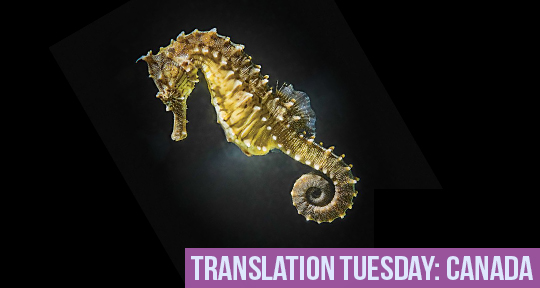These poems by Quebecois luminary Normand de Bellefeuille take the swelling rhythm of the sea as their guide. Translator Hilary Clark skillfully brings out the crash of waves beneath the verse, and this pulse of continuity is used to mirror the throbs of pain—and the bursts of poetry that spring from it. The tension between pain in life and the recording of pain is brought to the surface—a surface that is both the broil of the sea and the page, which covers and gives evidence to the drownedness of silence and the forgotten excesses of speech and sexuality that the poem can only trace. The impossibility of poetry to reify the body in pain is a hopeful one, though: as the poems give evidence of the subject, distilled, the inability to ever truly capture the depths of the body becomes the poem’s “inadmissibility.” The reader is tasked with trying to uncover the shining positive of that deficit.
7
There are other pains
even on the rivers
one thinks of Dante’s boat
or of the little crabs
in Ophelia’s hair
of the blind one’s swim
against the heavy wave
there are other pains
even under the sea
the seahorses’ grotesque gallop
the drowned women amorous
dead, still amorous
with breasts opened by the narrow teeth
of fat monkfish
for there are other pains
without screams, under the sea
one thinks of the children under the sea
lead at the ankles
mouth full of seaweed
anus full of seaweed
for there are also pains
that are unspeakable.
17
There is no economy of pain
no longer number for my pain
rather, claws and loud
hooves
against forehead
against sex
against the heart’s tender sails
but dropped sails
and thumping heart
a boat heavy with all the drums
of the world
a black boat and
Dante in the stern howling
a woman’s name
Beatrice, Laura or Mary
howling it against the rollers of
the Pacific
and in the nicely nicknamed
storms
of the North Sea
because there is no economy
of pain
nothing but thunder
the sailor’s wild cries
from the top of the mast
his throat burst open
by a thousand foreign syllables.
20
Yet the poem
knows nothing of pain
any more than the dead man
sings at the hour of his death
despite breath still
despite the stubborn voice
despite the head that sticks up, furious,
and the mouth that opens
with noble and great excess
thus, the poem knows nothing of
pain
lacks feathers
the poem lacks feathers, hair,
cartilage and wishbone
lacks even
the real words of pain
words without vowels
rumblings and feces
so many greasy groans at crematorium doors
so many women, bearers of grief
crazed mourners
nails broken off against the walls
of the wailing-rooms
the poem is inadmissible
the poem is vain
for the poem, luckily
knows nothing of pain.
Translated from the French by Hilary Clark
Excerpted from La Marche de l’aveugle sans son chien, Québec Amérique, Canada, 2000
Born in Montréal in 1949, Normand de Bellefeuille is an acclaimed Québecois poet, novelist, essayist, and critic. Presently Literary Director at Éditions Druide in Montréal, Normand de Bellefeuille has played an important role in the history of Québec literature since the 1970s. He has published several dozen books and has received many awards for his work, including the Prix du Québec (in 2017) and the Canadian Governor-General’s Award for Poetry (in 2016 and in 2000 for La Marche de l’aveugle sans son chien, from which these translations are taken). Canadian poet D. G. Jones’ English translation of de Bellefeuille’s Catégoriques un deux et trois (1986) appeared in 1992. A German translation of some recent poems by de Bellefeuille can be found at www.lyrikline.org
Hilary Clark is Professor Emerita of English at the University of Saskatchewan in Saskatoon, Saskatchewan, Canada, and now lives in Victoria, British Columbia. Clark received her doctorate in Comparative Literature from the University of BC (1985), writing her dissertation on James Joyce and French author Philippe Sollers. Her areas of teaching in English included critical theory, modernist literature, contemporary poetry, and creative writing. She has published three books of poetry with Canadian presses: Two Heavens (Hagios Press, 1998), More Light (Brick Books, 1998), and The Dwelling of Weather (Brick Books, 2003). In translating, she is particularly interested in surrealist and OULIPO writing.
*****
Read more translations on the Asymptote blog:

